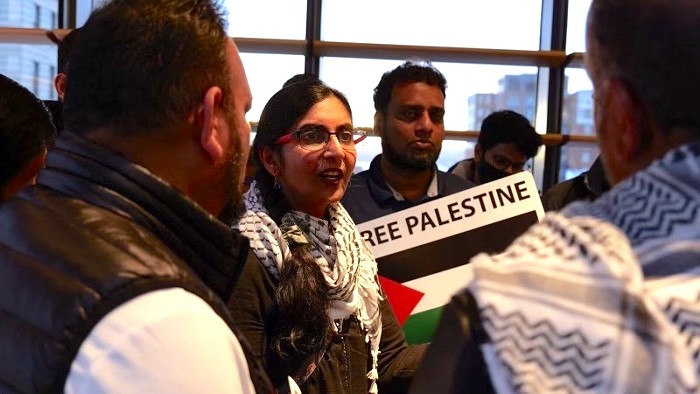
Our city faces an unprecedented housing affordability and homelessness crisis. Nurses, teachers, machinists, hotel and restaurant workers, public sector workers—and even the construction workers who are building the new gleaming skyscrapers—can no longer afford to live in Seattle. A recent University of Washington study found that a household needs around $90,000/year to afford the rent of an average King County apartment. More than 12,000 people in the county are sleeping on the street or in shelters, and at least 156,000 families are rent-burdened, one financial setback away from a similar fate.
Mayor Durkan has chosen to disregard this reality as well as the city’s workers and community members in her search for a new director of the city’s Human Services Department (HSD), which is ground zero for allocating public funds to social services. She has systematically ignored those voices, nominating interim director Jason Johnson without a public search for candidates. The city should not move forward with this nomination without engaging the community, which is why I am opposing the appointment of Mr. Johnson.
Behind the Mayor’s attempt to bypass a transparent and inclusive appointment search—and to sideline the overwhelming and numerous voices of those who oppose her choice for the HSD director position—is a broader attempt to silence opposition to her underfunded and punitive approach to the housing and homelessness crisis. The Mayor’s strategy effectively ignores the deeply embedded economic inequality, unaffordable rents, racism, sexism, and social inequalities built into the fabric of capitalism, problems that have been dramatically worsened by City Hall’s longstanding support for and reliance on the for-profit market.
Seattle urgently needs a major expansion of high-quality publicly-owned affordable housing and fully funded social services. King County estimates that 244,000 more affordable homes are needed countywide by 2040. This is only possible by taxing big businesses like Amazon and Starbucks.
HSD workers understand that the humanitarian crisis in our city falls disproportionately on people of color, immigrants, women, and the LGBTQ community, and they want a city leadership that understands that too.
Unfortunately, despite promising HSD employees an inclusive search for their new director, the Mayor did not engage with the community before she announced her selection on December 19. Immediately after, my office began hearing from HSD staff and the union that represents most of them, PROTEC17.
On January 9, my staff attended a union meeting in a room overflowing with HSD employees who care deeply about having a voice in the direction and the leadership of their department. Staff expressed dismay that the Mayor had overlooked their input and expertise in coming up with her nominee, Jason Johnson.
We also heard doubts raised about Mr. Johnson’s repeated unwillingness to listen to staff, high-handed behavior in meetings, and a displayed lack of understanding of race and social justice principles.
As chair of the Council’s Human Services, Equitable Development, and Renter Rights Committee, which is responsible for considering the Mayor’s nomination, I held a committee meeting on January 24 at the Miller Community Center. More than 100 people attended, and of the 35 who spoke, 34 opposed having the City Council approve the Mayor’s nomination of Mr. Johnson as the permanent HSD director. HSD workers presented a petition signed by over 130 members of PROTEC17 calling for the Mayor to begin an inclusive and accountable director search.
In response to the input at that meeting, I introduced a resolution outlining steps for the Mayor to involve community members in the selection of the next HSD director. Since then, HSD employees, the Seattle Human Services Coalition representing 180 social service agencies, the Seattle Silence Breakers, and many other individuals and organizations have written in support of the resolution.
On the evening of February 20, more than 100 people again turned out for a Human Services Committee meeting, where more than two dozen people spoke, including HSD staff, union members, service providers, and community advocates. Speakers unanimously urged council members to support a transparent public search as outlined in our resolution, which passed out of committee, and now advances to the full City Council for a vote on March 4.
It is unfortunate that rather than respect the views of so many of our brave city workers and service providers, Durkan has chosen not only to ignore them, but has characterized the meetings where they have spoken as “a continued circus instead of a substantive discussion.”
This week, just six days after dozens of homeless community members who rely on the SHARE/WHEEL indoor shelter network and the WHEEL low-barrier women’s shelter testified against the Mayor’s nomination of Jason Johnson as HSD director, they learned she intends to end their City funding at the end of June. This sets aside last fall’s unanimous City Council decision to fund them for the next two years. SHARE and WHEEL are among the shelters that have repeatedly been put on the chopping block by an establishment that both stymies efforts to fund new affordable housing and nickel-and-dimes homeless shelters. This latest move smacks of retaliation, in addition to being a classic neoliberal attack on social services.
This nomination is about much more than an individual. It is about holding the political establishment accountable to workers and the community. It is about the direction of the city: Will Seattle increasingly become a playground for the rich, or can we make it inclusive of everyone?
We know the power of getting organized in the face of big business and a political establishment. In New York, the hubris of politicians trying to coddle up to Amazon with a $3 billion corporate handout was roundly defeated by resistance from below by working people. Closer to home, Durkan experienced massive community resistance last year when she tried to name finalists for a new police chief without listening to the community, and she was forced to back down.
On Monday, March 4, the full City Council will be taking up the resolution for an inclusive search for candidates to lead Human Services. Fundamentally, though, the choice the other council members face on Monday is whether to respect and honor the voices of workers and the community, or to curry favor with the Mayor as she tries to ram through a neoliberal big business agenda in the face of our mounting housing affordability and homelessness crisis.
Kshama Sawant represents District 3 of the Seattle City Council.


















